Text
Hello! I agree with you that these anime reflect on identity. I resonate with what you said about trying to be yourself being hard because nowadays it's so hard to be yourself when people expect you to be different, when there is judgment, and because of the rejection you will face. I didn't think about that; Usagi led with care, not domination. Instead of taking over and overpowering, she uses her kindness and feminine energy to save people. Aggretsuko surprised me because, at first, I did not completely understand what was going on. However, when I heard the sexist comments the boss made, I realized that Retsuko let out the built-up anger by singing heavy metal music. In Wandering Son, I saw what it means to not feel at home in your skin. The kids did not feel like themselves when they were their original gender, but when they cross-dressed, they felt like they knew themselves better. Great response!
Blog Post: Sailor Moon / Aggretsuko / Wandering Son
Watching the assigned episodes of Sailor Moon, Aggretsuko, and Wandering Son made me reflect a lot on identity, and what it means to grow into yourself while the world pushes you in all directions. Each show brought something different, but they all pointed to the same truth, that trying to be who you are is hard, especially when the world has already decided who it thinks you should be.Sailor Moon surprised me with how much it focuses on emotional vulnerability. Usagi feels things deeply. She cries, panics, messes up, but still keeps on going. In episodes 1, 2, 4, and 8, we see her learning to lead by caring, not by dominating. That really stood out to me because it reminded me of the pressure many girls face to either grow up fast or be visually appealing, when in reality emotions are part of what makes people strong.Aggretsuko took a different tone, in season 1 episodes 1, 5, and 7, and season 2 episodes 2 and 5, I really felt for Retsuko. She tries so hard to play the good employee, to not cause conflict, or to smile even when she’s upset. But her death metal karaoke moments are like a scream for people who have felt stuck in systems where we can’t express ourselves. It hit close to home because I’ve seen people, especially women, work tirelessly in order to survive workplaces that don’t value them fully.Wandering Son was the most emotionally powerful for me. Episodes 1, 7, 9, and 10 were delicate and honest in ways I didn’t expect. Watching Shuichi and Yoshino navigate gender identity, especially in school where conformity is intense, made me reflect on how painful it is to feel like your truth doesn’t fit the hand you were dealt. Even though their experiences are deeply tied to Japanese cultural norms, the themes of self discovery and trying to be seen felt universal.All three shows made me think more deeply about how society shapes identity, and how hard but necessary it is to push back.



4 notes
·
View notes
Text
"Sailor Moon", "Aggretsuko", and "Wandering Son"
The anime “Sailor Moon”, “Aggretsuko”, and “Wandering Son” all have unique approaches to gender performances and femininity. Although they have different storylines, they all follow the main characters who are women. In “Sailor Moon,” Usagi Tsukino runs late for school as usual, and she runs into a cat with a moon shape on its head. Usagi is not a very smart girl, and she is not very good in school, but for some reason, the cat she ran into came into her room and started talking to her. Luna, the cat, gave her a brooch and told her to say, “Moon Prism Power, Make-up,” and she turned into Sailor Moon. Sailor Moon then saved many people from Jadeite and the evil queen. Sailor Moon is depicted as a cute little girl, but when she needs to, she transforms into a superhero who saves the day. However, when she becomes the hero, she is still depicted as very feminine. This relates worldwide because women are seen as vulnerable, not smart, and cute, but people tend to undermine them. They are strong, powerful, and capable of changing the world.
In “Aggretsuko,” we follow Retuko as she goes to work as an accountant. She does not love her job because her boss is sexist towards her. For example, he mentioned that women are made to clean up after people. She would release her anger at the local karaoke bar and sing heavy metal. I relate to this show because so often I face comments about my gender, whether that be that girls can not be leaders or that girls are meant to stay home and clean.
In “Wandering Son,” we meet two transgender kids: Yoshino, who is a girl but dresses and acts like a boy, and Shuichi, who is a boy but dresses and acts like a girl. They both try to avoid puberty as much as possible, but eventually they go through puberty, and it makes them even more confused. During this anime, these kids navigate their identity and try to figure out how and if they can be who they genuinely want to be.
The theory by Judith Butler enhances my understanding of these anime. Whether it be Sailor Moon uses her feminine side to embrace her superhero powers, Retsuko being very lovely and submissive at work, and then going to karaoke to relieve her anger, or the kids in “Wandering Son” figuring out who they are through their gender.
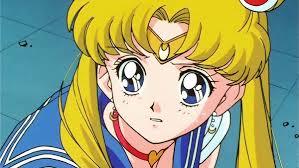
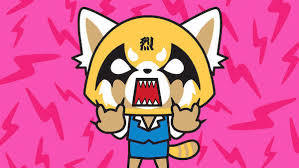
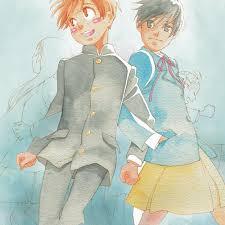
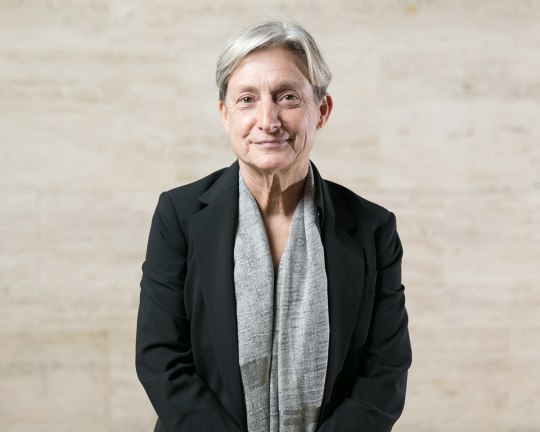
4 notes
·
View notes
Text
Hello! I have never heard of this convention, but it sounds so cool. Conventions and fan gatherings not only allow you to come together with people who share the same interests but also give you many amazing opportunities, such as meeting your favorite streamers. I love how you said that no one had to worry about being called a nerd because you were in a space where everyone shared common interests and connected over those interests, without anyone being different. I agree with you that fandom is a way people find their identity, and it allows them to be unapologetically themselves without worrying about judgment from the outside world. This sounds like a fantastic experience and a great example of being submerged in fandom.
Guardian Con 2018
Back in 2018, I attended Guardian Con in Tampa Florida, a gaming convention originally centered around the video game series Destiny that eventually grew into a wider celebration of gaming and community. At the time I was really into both Destiny 2 and Fortnite, spending as many hours as I could immersed in these games not just for the gameplay, but for the friendships and shared sense of purpose they offered. Attending Guardian Con was my first experience with a large scale fan gathering, and it completely changed how I understood fandom, as a deeply communal and force. One of the highlights of the convention was getting to meet some of my favorite streamers, including Dr. Lupo and Ninja, who at the time were two of the biggest names in Fortnite. Seeing them in real life was surreal. These were the people I watched nearly every day online, whose content made me laugh and inspired me. Meeting them face to face was grounding. It reminded me that fandom isn’t just about celebrity or media content. It’s about the human connection we build around shared passion. Gaming has always been a big part of my life, but Guardian Con made me realize that it’s also a key part of my identity. Playing Destiny online with friends and strangers from across the world gave me a sense of community I didn’t always feel irl. At the convention, I got to play the game with other attendees in person, shout out meet my favorite streamers, and talk lore with my Dad who was just as invested in the universe as I was. Nobody's worried about being stared at for what they're wearing, or being called a “nerd” who spent too much time gaming. Instead everyone at Guardian con appreciates one another and it becomes a place where people can and enjoy themselves in the company of peers and friends who share the same passion. This experience ties directly into the class discussions we've had about how fandom and youth culture intersect. As scholars have pointed out, fandom is a form of participatory culture, where fans don’t just consume media but also help shape it through interpretation, conversation, and community. At Guardian Con, I saw this in action. Cosplayers walked the floor dressed as their characters from Destiny Panels and meetups encouraged players to share stories, content, and theories. Streamers talked about how the feedback they received from fans helped shape the way they played and even what they streamed. Everyone there was not just a spectator, but a participant in shaping the culture around these games. One of the most memorable moments for me was watching Ninja and DrLupo play Fortnite live on stage. Even though none of us were playing, we all felt like we were part of the game. That shared emotional investment, created a sense of belonging that stuck with me. These streamers were figures through which we fans could connect, celebrate, and even dream. Looking back, Guardian Con 2018 was a formative moment. It showed me how fandom can be a powerful tool for identity, especially for young people navigating who they are and where they belong. In that space, I was a fan, a community member, and someone who could connect with others through shared passion. Even now, years later, I still carry the memory of that experience with me. I may not log into Destiny 2 or Fortnite as often, but the friendships I formed and the belonging I felt at Guardian Con remind me that fandom is more than just media it’s about people, connection, and finding where you fit in the world.

3 notes
·
View notes
Text
Anime Convention and Fan Gatherings
When I visited Tokyo, Japan, I had no idea that I would be stepping into the world of anime. I knew Tokyo was the hub of anime and manga, but I had no idea that it was going to be that vibrant and busy. I had always loved anime growing up, but nothing prepared me for what I experienced in Japan. It was no longer about watching the anime; it was about being fully immersed in a culture where anime was not just for entertainment, but it was part of their lives. It was on billboards, trains, on snack packages, and even in the bathrooms. This is where I experienced true fandom.
The first place we visited was Akihabara, which is known as the Electric Town, and boy, when I tell you this was an experience. There was color, energy, and action. Buildings were wrapped in banners with the most popular anime, such as My Hero Academia. Shops were overflowing with merch. It felt like each anime had its own store. I found things that I could only find there, like rare action figures. But what was even more amazing was the people. People were dressed in full cosplay just walking down the street. Come to find out, most of them dressed up in cosplay for work. And there was no judgment.
While walking around, I came across a group of people all dressed very similarly, so I went to see what was going on, and it turned out to be a gathering of fans for Sailor Moon. I found myself surrounded by so many Sailor Moon fans in front of the Sailor Moon Cafe. It was literally like I was walking onto an episode of the show. There were Luna stuffed animals, milkshakes with a moon on them, and even food with the characters on it. Fans were getting to know each other even though they were from all across the world. They were giving each other goodies and sharing their favorite moments from the show. I would not consider it a convention, but a fan gathering. Tons of fans began swarming in, dressed as their favorite characters from Sailor Moon, eager to get to know one another. At this point, I felt like I belonged here. It was truly a fantastic experience because we all shared similar interests and understood each other, which is something I hadn't felt in a long time. After leaving the cafe, we just started walking, mesmerized by the anime and manga. On every street corner would be someone in cosplay handing out pieces of paper that were inviting you to their cafe or store. What shocked me the most was how normal it was to everyone. It was like everyone was used to this excitement.
Throughout the rest of the trip, we had multiple fan encounters like we did at the Sailor Moon Cafe, and it felt as though we were literally at an anime convention the whole trip. Being in this class made me reflect on my time in Japan. It made me realize that fandom is so prevalent in Japan. These people travel across the world to attend conventions and gatherings because they provide a space for them to be themselves and express themselves. Today, the younger generation, especially in Japan, is growing up seeing how normal it is to be fans of anime and manga. They are learning that there is a place for them and their passions, and they can share them with others who share the same passions. Not only this, but fandom transforms Japan's economy and is a leading factor for why Japan is so economically successful.
Although I did not attend an organized fan gathering, I did participate in numerous fan gatherings in Japan, including the Sailor Moon gathering. It was incredibly cool to be in the very country that anime and manga are most known for, while attending these gatherings and contributing to the fandom.
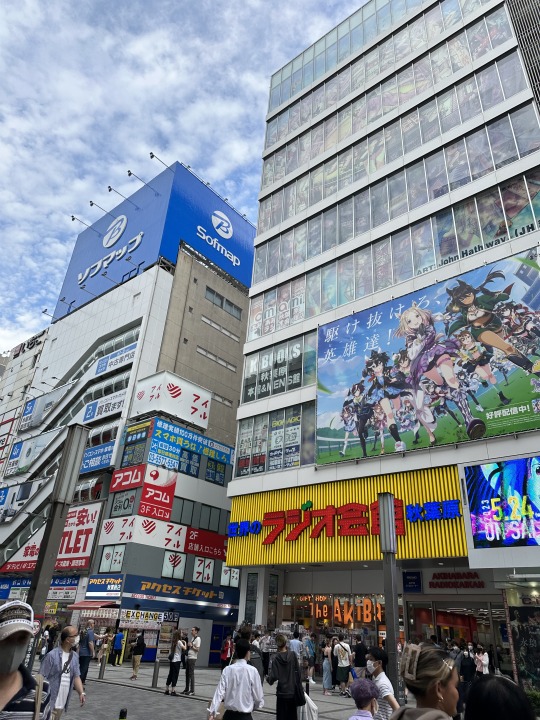
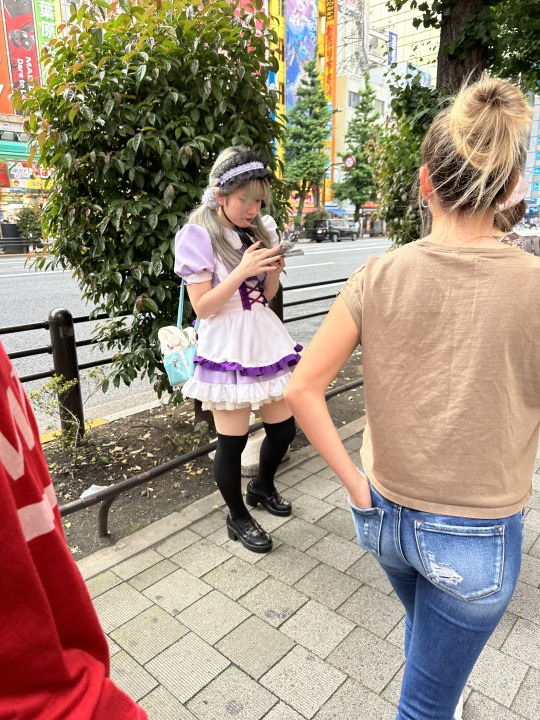
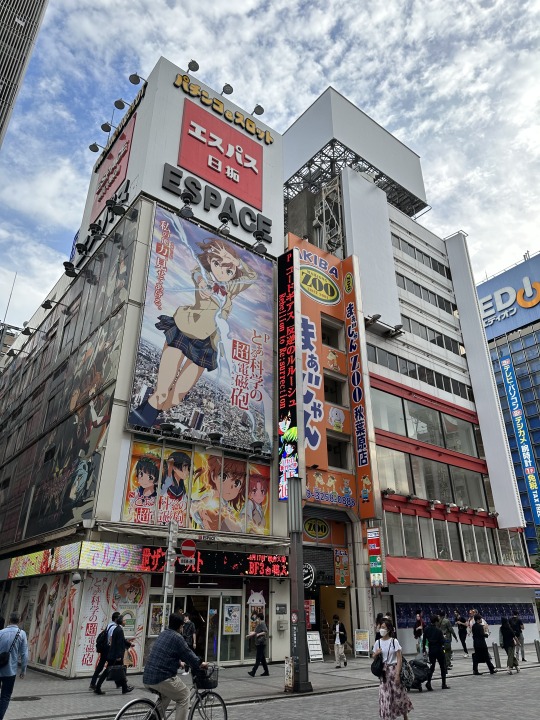
4 notes
·
View notes
Text
Hello! I agree with you that this anime explores how people feel isolated, as if they do not fit in. In the beginning, the main character struggled to find a club that he felt was a good fit for him. He settled on joining The Society for the Study of Modern Visual Culture, but he was still unsure if he was interested in it. After some time, he realized that he felt ashamed for being an otaku, and he finally felt like he belonged. I also identify with this because sometimes I feel scared of sharing my passions due to the fear of rejection. A significant portion of this anime focuses on exploring fandom. We see that the characters in this are huge fans of particular anime or manga. Throughout the anime, we see them watching anime, reading manga, attending conventions, and discussing their favorites. Because of this, it validates that fandom is a huge part of Japanese culture. I feel like this anime was definitely different from the others that we have watched. This was a great response!
Genshiken
What stood out most to me about Genshiken was how well it handled a nuanced and insightful exploration of identity and feeling like one belongs within subculture realms. Rather than presenting otaku culture through sensationalism or exaggeration, the anime presents a human, realistic portrayal of individuals coping with societal pressures while retaining a robust passion for anime, manga, and games.
Through its character-based storytelling, Genshiken encourages the audience to consider how other communities devise sites of self-expression that are frequently overlooked within mainstream culture. The series focuses on the hypocrisy of Japanese society today, specifically the stress of conformity to rigorous social roles and expectations in school, at work, or in one's own life.
In this, Genshiken club provides a sanctuary where characters can just be themselves without adhering to socially standard norms. This judgment against conformity is not restricted to Japan alone. Subcultures across the globe continue to provide comfort to those individuals who feel cut off from dominant cultural norms. I especially identified strongly with this. Being a person who also has to juggle socially "acceptable" roles with more individualistic interests, I empathize with the emotional significance of these groups.
Saki’s character growth acts as an important perspective for viewers to reflect on their own prejudices. At first, she disregards the group, but over time, she learns to appreciate their realm, even if she doesn’t completely grasp it. This evolution reflects wider societal changes in the perception of fandoms and subcultures, transitioning from ridicule to careful appreciation.
With regard to the subcultures and media usage readings, Genshiken provides an on-the-ground narrative illustration of our theories. It highlights the significance of community in organizing identity and shows how media usage can be an individual sanctuary and an act of cultural resistance.
In the end, it provides more than a representation of otaku culture; rather, it is a contemplative investigation of acceptance, identity, and the powerful impact of community.
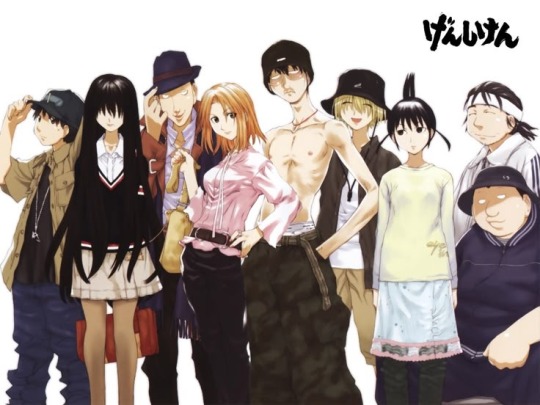
4 notes
·
View notes
Text
"Genshiken"
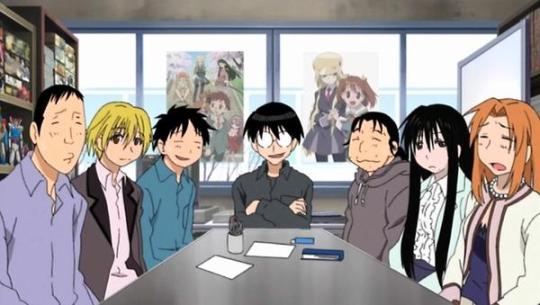
When I first started watching "Genshiken," I was unsure where it was going or what message it was trying to convey; however, after diving deeper, I realized that the anime was exploring fandom and finding identity in Japanese culture. The anime began by following a freshman in college as he explored different clubs he could join. He came across a club called The Society for the Study of Modern Visual Culture that focuses on Otaku. After some time, he realized that he genuinely enjoyed the club and its members, who shared his interests in reading doujinshi, playing adult games, and attending conventions.
In the anime, Sasahara struggled to admit that he was an otaku. He felt ashamed at first and thought he needed to hide his passions. But eventually, he found his people, and he realized at the convention that everyone was there for the same thing, and they all shared the same passions. We can observe this issue worldwide. We often fear sharing our passions due to the fear of rejection.
This anime also focuses on fandom culture. Fandom is a community of people who are fans of something. In this anime, we see that the characters are fans of manga and anime, specifically doujinshi. Sasahara found his community through fandom. Nowadays, we see that fandom is an extremely important part of Japanese culture, as well as cultures worldwide. For many people, fandom is a way to connect with others, themselves, and their favorite characters. Fandom is also a large part of Japan's economy, as it contributes to the entertainment industry.
"The Cultural Economy of Fandom" by John Fiske discusses how fans not only consume anime or manga but also produce it. Meaning they alter the works to their own. We see this in the anime, as it illustrates how otakus are immersed in fandom, whether through reading, watching, or even creating their content.
3 notes
·
View notes
Text
Hello @solriavtz, this was a great response to these three anime! I agree with you that these anime were highly emotional, and it's clear the amount of time and effort that went into creating that emotion. Each of these anime examines the discrimination of children, as well as how they overcame it. My favorite was A Silent Voice because I loved how it highlighted the issue of how bullying affects mental health. I believe that people think mental health issues are a weakness, and because of that, it is not widely talked about, so I love how this anime proudly shows the emotion. These anime all examine issues we deal with today, whether it be overcoming social discrimination, not feeling like you can show who you truly are, or being bullied because of your disability. Great response!
Naruto/Wolf Children/A Silent Voice Blog Post
Watching Naruto, Wolf Children, and A Silent Voice back-to-back was an emotional rollercoaster. Each anime, in its own way, opened up windows into Japanese culture while simultaneously touching on struggles that feel universal—family, identity, belonging, and redemption.
Naruto stood out for its intense focus on perseverance and the loneliness of being an outsider. Naruto's journey from being ostracized to being respected mirrors the struggles many kids (including myself at times) face when trying to fit into a world that misunderstands them. His constant need to prove himself resonated deeply with me and reminded me of how important it is to have people who believe in you.
Wolf Children took a much more intimate and quiet approach, focusing on motherhood and the sacrifice it demands. Hana’s resilience as a single mother raising children who don't fit into society’s norms was both heartbreaking and beautiful. It made me reflect on how much our parents, especially mothers, often endure without complaint. The film also subtly critiques rigid social expectations in Japan, while engaging in global conversations about identity and belonging.
A Silent Voice had the strongest emotional impact on me. Its portrayal of bullying, guilt, and mental health was incredibly raw and relatable. Shoya’s journey to redemption and Shoko’s quiet strength brought me to tears. It made me think about how we often don’t realize the weight of our actions on others, and how hard it is to forgive ourselves. This film speaks to Japan’s struggles with mental health stigma, but also connects universally to anyone who’s ever felt like they didn’t deserve a second chance.
Each anime, though different in style and tone, offered powerful reflections on what it means to be human.

6 notes
·
View notes
Text
"Naruto, Wolf Children, and A Silent Voice"
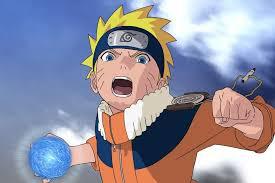
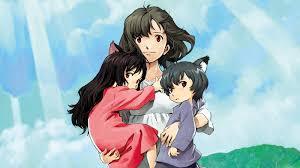
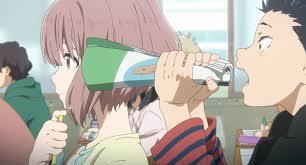
Just wow! I have to say, these three were my favorite anime that we watched this course. All three of these anime had their storylines; however, they shared a common theme: children undergoing discrimination but learning to overcome it. In "Naruto", Naruto is an orphaned troublemaker boy with a demon, known as the Nine-Tailed Fox, inside him. He did not know he had this demon inside of him, but he always wondered why people rejected him. He was the odd man out most of the time, even when it came to excelling in school. He wanted people to see him and love him so badly. Finally, he realized that he wanted to prove these people wrong and show them that he is not a horrible person. We see this when he faces the villain Pain, who destroyed Naruto's home village. They called for Naruto because he was the only person who could defeat Pain; however, he did not exactly defeat him. he chose to listen to him and reason with him, and it ended in Pain bringing back to life all the people he had killed in the destruction. After Naruto went back to the village, everyone was celebrating him and thanking him for everything he did. For me, this scene had a profound impact. It shows me that no matter what I go through, good will come out of it. From this anime, we also see war and peace, just as we do in our world today. We see war and hatred, but then we see the effort of making it right.
Next, we see a different approach to this theme in "Wolf Children". A young college girl falls in love with a werewolf, and they have two wolf children; however, he suddenly dies. Hana makes the children hide their wolf identities from the world, and even gets questioned if she is a fit mother because of her not taking them to the doctors. She was so scared that people would judge them for their true identities. Finally, Hana realized that these children needed to be free, so they moved to a very off-the-grid home. The children have the opportunity to be themselves, whether they be human or wolf, without the judgment of the world. As the children grew older, she enrolled them in school and taught them how to control their wolfish urges. As the children entered their teenage years, they finally realized who they were and chose the path of life they were going to take. Ame decided to connect with the wolves, while Yuki chose to be a human and attend school. Ame and Yuki did not directly face discrimination; however, Hana shaped their childhood around the fear of their identity, hiding who they were. People all over the world, including my younger self, are often scared to express or show who they truly are due to the rejection of the world, just as we see in this anime.
Lastly, "A Silent Voice" told a beautiful yet emotional story about a bully named Shoya. He bullied a deaf girl in elementary school called Shoko and also told others to bully her as well. He went as far as harming her physically. However, Shoya was eventually bullied when Shoka transferred to another school. He finally realized what it felt like to be bullied the way he bullied people. After years of being bullied in elementary school, he felt guilty and tried to commit suicide. He tried to make things right with Shoko by learning sign language, buying her bread to feed the fish, and befriending her. Eventually, Shoko attempted to commit suicide because she felt bad for being a burden on her family and friends' lives; however, Shoya saved her. I appreciate this anime because it closely examines the impact that bullying can have on mental health worldwide. This movie was a great reminder to always see people for their character, not for their looks, disabilities, or status.
5 notes
·
View notes
Text
Hello Alisa, this was a great response to the anime "Shin Sekai Yori". I agree with you that at first, the anime was just about kids in an oddly peaceful town. However, after further examination, we see that the government of the city would do anything to keep this peace, even murdering children who do not contribute to the perfect society. I find your comment about Saki discovering the truth as she matures to be consistent with our world today. As children, we are often sheltered from the bad in the world, but as we grow older, we become more curious and want to make our judgments. "Psycho-Pass" and "Shin Sekai Yori" share a similarity in that the government or authorities attempt to control people's lives to maintain the peace and safety of the entire population. Thank you for your response!
Shin Sekai Yori
Shin Sekai Yori is one of the most intellectually stimulating anime I’ve ever seen. At first, it seemed like a serene coming-of-age tale in an unusual, tranquil village, but it gradually uncovers a far more sinister and intricate reality beneath. What particularly caught my attention was the way the anime examines control, memory, and the essence of being human. The anime society appears tranquil on the surface, but it is founded on sacrifice, control, and fear. Individuals possess psychic abilities that are quite hazardous, so in order to offer safety, the government of the village employs mind control, strict rules, and even murders youths who demonstrate instability. It caused me to reflect a long time and hard upon the degree of control that one society must exert in order to maintain peace and what we sacrifice in the process. The most compelling aspect for me within this tale was observing how the children, particularly Saki, gradually find the truth as they mature.
Their entire life was a deception to protect them, but also to keep them compliant. This made me think of Psycho-Pass, where individuals are controlled "for their own good," and how that kind of control destroys their capacity to have genuine choice. Shin Sekai Yori does one better by asking you to question who determines what's right and what's harm. It also broached issues of remembrance, how history is warped to keep things in order, and the dangerousness of knowledge in a lying-based society. This anime encouraged me to think of real-life issues like censorship, eavesdropping, and disparity. The way humanity treated the "Monster Rats," a race that they had defeated, presented the way fear and dominance may result in discrimination and brutality. Overall, Shin Sekai Yori wasn't an easy watch, but it caused me to think long and hard about control, fear, and what kind of world we're making when we trade freedom for security.
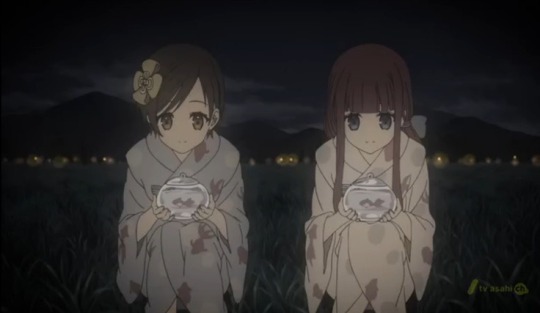
4 notes
·
View notes
Text
"Shin Sekai Yori"
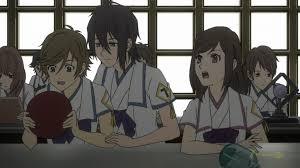
I have to say that in the first episode of "Shin Sekai Yori," I was pretty confused. I did not completely understand the plotline of the story until after watching multiple episodes. "Shin Sekai Yori" follows children born in a "perfect" town, but telekinetic powers rule it. This anime follows Saki and her friends as they uncover the truth about their home, as their authorities withheld vital information regarding the powers and the past. The children are monitored very closely. If they begin to show instability or incompetence, or even fail to develop their powers, then they are never seen again. Those children are perceived as dangerous, and unfortunately, the anime shows that they would allow anything to happen if it meant protecting the town's peace. This makes me realize how horrible it would be if our country got rid of all of the people struggling, but it makes it worse that this anime is getting rid of children struggling.
While I do not believe that Japan or any other country deals with this exact issue, children are punished very quickly for their actions while constantly being degraded because of their youthfulness. When a child misbehaves in school, they are often punished by being expelled, suspended, or given a lecture. While discipline is indeed a good thing, it should also have a teaching aspect so that the individual knows what was done wrong.
In the article, "The 'Wild Child' of 1990s Japan," it speaks about a 14-year-old kid killing other kids. It makes sense why the Japanese feared children because of the horrible things this child did; however, they should be helping them rather than fearing them, and they also have to realize that not every kid has evil tendencies.
Another issue I noticed in this anime is that these children lack the freedom to be children. They are under surveillance and cannot do anything. Instead of being normal children and playing with toys, they are playing with dangerous telekinetic powers.
3 notes
·
View notes
Text
Hello, this was a great blog post about "Psycho-Pass". It is scary to think that innocent citizens could still be punished, even though it is only a probability that they might commit a crime. I agree with you that in today's day and age, we have to be perfect at all times, and it is seen as a weakness when you show emotion. With social media, we only see the good part of people's lives and not the bad. I also appreciate Akane taking action against this system because it is a flawed system that takes the souls from people. Your post allowed me to see that, like you stated, peace in a society comes with freedoms, not condemnation. Thank you for sharing!
Psycho-Pass
Psycho-Pass really caused me to reflect on what it means to live in a "perfect" society and what we sacrifice in the process. The anime is set in a future where everything is controlled by the Sibyl System. It can sense the mental condition of an individual and whether they would or could commit a crime. If a person is over-stressed, fearful, angry, or depressed, their "Crime Coefficient" is heightened, and they may end up being arrested or even murdered, even though they are innocent. The frightening aspect is that individuals begin concealing their feelings just to feel secure. All human beings are supposed to be relaxed, cheerful, and "stable" at all times. One single emotional error can destroy your life. That thought really resonated with me because I feel like in our culture today, there's always this pressure to show that everything's okay all the time, particularly on social media. One is graded on things like grade levels, productivity at work, the way one looks, and even one's mental state, yet one is not always permitted simply to be human. If you're never winning, it's simple to feel like you're in the back. One thing that I absolutely loved about Psycho-Pass was the way it avoids simple answers.
The Sibyl System is supposed to provide security and harmony, but it erodes liberty, privacy, and individuality. Individuals no longer have the freedom to choose for themselves because everything is chosen by the system. That caused me to think about the way real systems, like school ranking, monitoring, and job tracking, limit freedom even though they were meant to help. I also appreciated the main character, Akane. At first, she trusts the system, but when she sees its flaws, she will not silently go along with them. She doesn't hit back in a melodramatic way, but she is strong, thoughtful, and faithful to what she believes in. I believe that quiet tolerance is as strong as resistance. Psycho-Pass led me to consider how simple it is to surrender autonomy in the guise of safety, and insisted that genuine peace must involve freedom, choice, and empathy, and not merely structure.
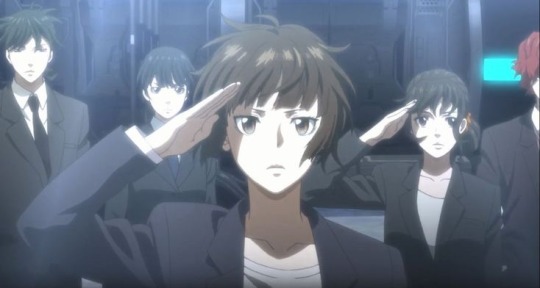
7 notes
·
View notes
Text
"Psycho-Pass"
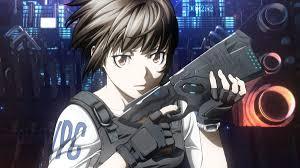
Imagine living every day with the fear that your life is being watched under a microscope. The series "Psycho-Pass" examines this fear among the citizens of Japan. In this anime, Japan is governed under a system called the Sibyl system. The Sibyl system is stringent on following the law, even if that means they have to take away personal freedoms. The system works by continuously assessing citizens' minds with the Cymantic scanner. The scanner results in the Psycho Pass, which contains the stress levels and a crime number. The results from the Psycho Pass are the probability of a citizen committing a crime. Depending on whether the number is above a certain amount, the citizen will be injured by the Dominator, which transforms based on the severity of the number.
To put it bluntly, the system is trying to execute the citizens who do not fit into the perfect order. Makishima, the creator of this plan, aimed to develop a system that would enforce the law to foster a more peaceful society, thereby creating a utilitarian society. Not only does this system determine the likelihood of you committing a crime, but it also questions free will. Citizens lose all ties to free will as the system determines everything for them, from their mood to their jobs. Because they are under surveillance, their actions are always being watched to make sure they are following the laws. This mirrors panopticism because the citizens know that they are being watched, and at any moment, the higher power could take control of them. They have to be perfect at all times to keep a good Psycho Pass. This surveillance completely diminishes freedoms. Michel Foucault, the developer behind panopticism, based this concept on a Panopticon, a circular prison where a guard in the middle watches inmates. Still, they do not know when they are being watched. When people are watched, they tend to act more timidly. Surveillance takes away the freedom to privately live, think, act, and do. Another issue is that these citizens are being punished for a crime they have not committed, based on a mere probability.
Although I do not believe that the real world has this level of control and surveillance, technology makes decisions about people. Also, spyware that is supposed to be used for combat is now being used to spy on people for unnecessary reasons, such as monitoring those who openly share their views, including public figures. However, in America, we do not have these issues, and if we do, they are nowhere near the intensity as shown in this anime.
1 note
·
View note
Text
Hello Alisa! I agree with you that technology is completely changing the way we live. By just having this phone, Takizawa controls the outcome of his nation. I could not imagine being in his position. While I would love to improve our country, the amount of pressure to perform such a big task is terrifying. In "Sword Art Online," the characters began to realize that this was their new normal, so they tried to continue with their lives while completing all 100 levels, even while being in a fantasy world. You raise an excellent point that all of these things make us vulnerable. We lose control and give in to it, but thanks to the lessons from these anime, we've learned to make the correct decisions, even virtually. I enjoyed these anime, especially "Eden of the East." This anime, while quite confusing, created a sense of hope that there are people in the world willing to change it for the better.
Eden of the East and Sword Art Online
After Eden of the East and Sword Art Online, I have been giving more consideration to the way technology is transforming our lives and the way that power is exercised by people, particularly regarding money and the internet. In Eden of the East, an individual is given special phones that afford them 10 billion yen and the task of "saving Japan." That doesn't necessarily sound impressive, but I grew to realize how daunting and complex that challenge would be. The protagonist, Takizawa, wants to help people but has no idea what it actually means to "save" Japan. This made me consider just how hard it would be to actually cause the world to change despite having good intentions and authority. It's not even a question of money; it is a question of understanding people, mechanisms, and consequences.
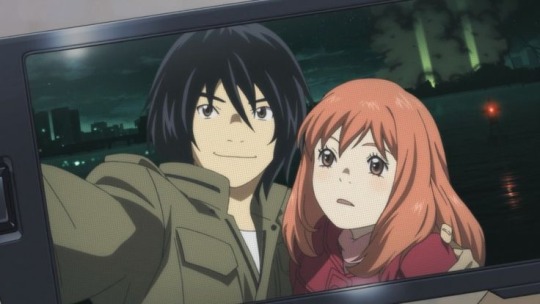
Sword Art Online is a different scenario but overall illustrates the same manner in which power can trap individuals. In this series, gamers are trapped in a game in which game death results in real-world death. What was most compelling was not the action but the real relationships and emotions displayed, notably even in a virtual environment. It made me see that just because something occurs online doesn't make it less real. Our actions and feelings in digital environments can be hurt as much as our real-world equivalents.
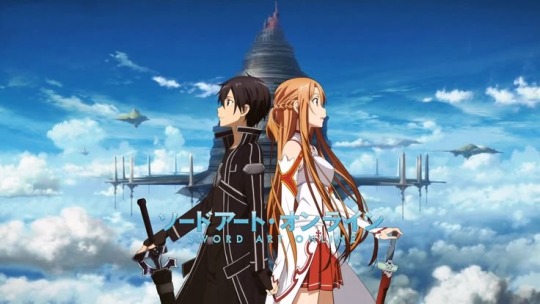
Both series made me realize how we are prone to following a system or rules without ever asking questions. Reflecting on my own life, school, social media, and shopping, I could observe how we so easily give up control without even realizing it. These two anime, ultimately, made it so that we should be aware, make choices that are right for our own values, and be kind to others, both in the world of the internet and in the actual world.
6 notes
·
View notes
Text
"Eden of the East" and "Sword Art Online"
After watching "Eden of the East" and "Sword Art Online," I realized that both of these anime have a deeper meaning beyond just enjoying the plot. Both reveal political, economic, and social issues faced in the real world of Japan and the fantasy world. The anime's main characters, Akira Takizawa and Kirito, tell emotional stories as they try to save something that no longer feels recognizable.
In "Eden of the East," Akira Takizawa appeared naked in front of the Capital building. He had no memory or recollection of how he got there, but he did have a phone that contained 10 billion yen. After some time trying to figure out what was going on, he realized that he and twelve other people, known as Selecao, were instructed by Mr. Outside to change Japan for the better. One of the main issues evident throughout the series is the growing disconnection of the younger generation in Japan from their surroundings. These people were known as NEETS. Akira attempts to save Japan by giving this group of people a sense of purpose. He uses the 10 billion yen to create an outlook for these people. Akira wanted outsiders to see the NEETs not as lazy, unemployed people, but as individuals who would do anything to better their country. Historically, Japan is known for having a career-driven society, where people are often judged based on their job and level of success, according to Mouer. This film challenges Japanese culture in this aspect while reflecting on the influence of neoliberalism. Another issue I observed is that the people or systems that are meant to protect the people are not. They are turning away from that and becoming the opposite of what they are meant for.
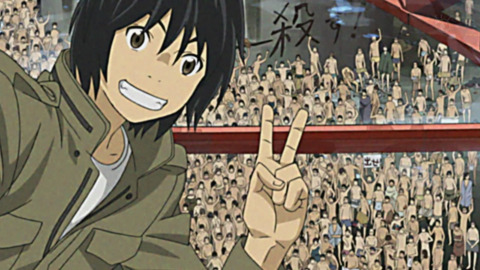
In "Sword Art Online," a large group of online video game players became trapped in a virtual reality. The master of the game, Kayaba Akihiko, informed the players that they had to fight to survive both within and outside the game, and the only way to return to the real world was to complete all 100 levels. The players have nothing but themselves; not even the outside world can assist them. Leveling up can be measured by a single player's skill, which, upon closer examination, can be seen as neoliberal. If a player falls behind or is not strong enough, they will suffer. Just like "Eden of the East," players were judged based on career success. This reminds me of our own lives because there is so much pressure and competitiveness that people face when in the labor market. One must be leveling up, or they will be left behind and eventually fail.
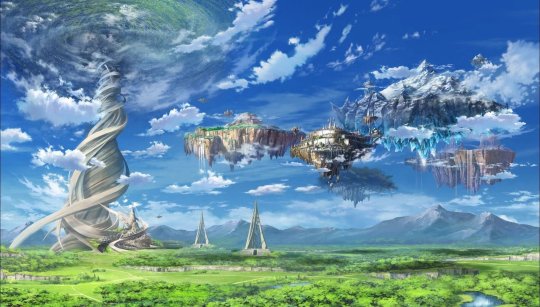
Both anime appreciate Baudrillard's idea of simulations and simulacra and how they become more of an actuality. In "Eden of the East," the control of the country creates a simulated world, and in "Sword Art Online," the online world becomes the real world in all aspects.
2 notes
·
View notes
Text
Hello Cooper! I also really enjoyed this movie, and there are many influential lessons built into it. I also agree with you that "A Place Further Than the Universe" was not as interesting as "Spirited Away". It was very drawn out, but still good. Professor Smith spoke about how the girls in "A Place Further Than the Universe" were trying to escape the influence of capitalism in Japan, so they traveled to a place where it is not prevalent. The girls survived and did very well in Antarctica; however, they realized that, unfortunately, it is more straightforward and more realistic to live in a capitalist nation. Each of these anime has many lessons that can be learned, beyond consumerism, such as independence, how to bounce back from grief, and the value of friendships, which can be applied to our lives. Great response!
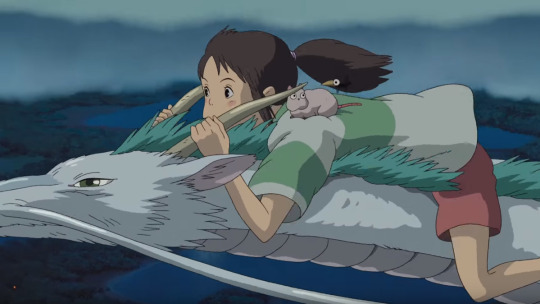
Blog Post #1
ZOO-WEE-MAMA!!! I really, really, really liked this movie, “Spirited Away”!! At first, I have to admit, I was skeptical! I think it started very slowly, and I was pretty disinterested. But as I got to see more and more of the characters, I was hooked! I loved the way the spirits moved and were drawn. In particular, this character Kumaji, who worked on the boiler, holy smoke, that character is cool. The way his movements were animated, the way he sounds (for reference, I watched the English version), and the way he looks, geez louise I love that character so much. Anywho, the other show “A Place Further Than The Universe” was alright. I think that “Spirited Away” better addressed the issues of Consumerism, and to be honest, I have no idea what “A Place Further Than The Universe” was even trying to capture. I mean, it's just a group of girls going to Antarctica, sharing heartfelt memories, what does it have to do with capitalism? I do think that “Spirited Away” relates to my own life and experiences, as I find myself dealing with spending using credit and endless consumerism (I can't stop buying useless stuff for the life of me). But I’ve never wanted to go to Antarctica with a group of 3 people I don't know. “Spirited Away” definitely relates to the reading as it is a direct critique of capitalism and endless consumerism, with Granny representing an escape from that and a life quiet and tucked away from consumerism. Granny’s twin sister looks exactly like her, but showcases how consumerism can corrupt absolutely. But we do see an escape from this consumerism, represented by No-Face, who manages to escape it. No-Face at the beginning of the movie, I thought was just a representation of Chihiro's loneliness, but ended up being a representation of escape from consumerism, which I enjoyed. Anywho, thanks for listening to my TED talk. Have a good 4th of July, gang!
3 notes
·
View notes
Text
"Spirited Away" and "A Place Further Than the Universe"
After watching both "Spirited Away" and "A Place Further Than the Universe," I was captivated by the stories; however, I became distracted by the landscapes, colors, and comical skits, and I almost completely forgot to look for the underlying messages. In "Spirited Away," there are numerous examples of consumerism, such as the spirits being coerced by the gold No-face was producing, and Chihiro's parents greedily eating the food left for the spirits. In "A Place Further Than the Universe," how is capitalism depicted? The four girls escape to get away from the capitalist country, but they realize that it is much easier to live in a capitalist country. Yes, we discussed how consumerism and capitalism are portrayed throughout these anime; however, we also observed additional issues. Both of these anime deal with some form of grief. In "Spirited Away," Chihiro's parents ate the food put out for the spirits, turning them into pigs. Chihiro did everything she could to find her parents and turn them back into humans, even risking her life. She felt hopeless and desperate. Similarly, in "A Place Further Than the Universe," Shirase's mother had been missing for many years in Antarctica. Shirase made it her life's goal to go to Antarctica and find her mother, and she did everything in her power to achieve that goal. In both instances, the characters overcame their grief. Due to these issues with their parents, the girls had to grow up and learn the ways of the world more quickly than anticipated. The main characters in "Spirited Away" also faced challenges with anti-feminist ideas.
For example, for work, Chihiro was forced to clean the most disgusting bathhouse because she was a maid. The Japanese view women as dependent on men. However, in "A Place Further Than the Universe," the four girls resisted anti-feministic issues by going to Antarctica and working alongside everyone else. Not only this, but the leader of the group was a female. Eventually, Chihiro realized that she was not confined to her maid job, and she began looking for her parents and trying to get home. Both of these issues can be observed globally and, unfortunately, in my own life as well. Grief and hopelessness are far too common in everyday life, and so is a woman having to overcome barriers that were set in our lives because of our gender.
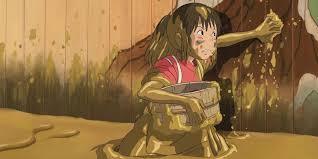
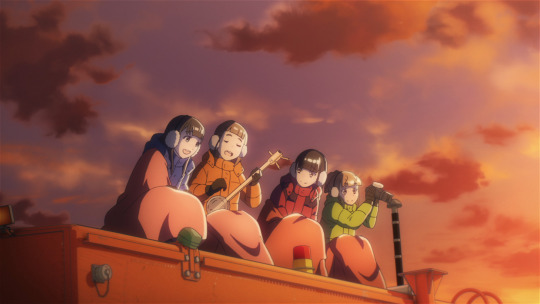
While these issues are subtly shown throughout these anime series, they have a significant impact on the characters' lives. The only connections I found were between the two anime. I did not see the readings to connect with the topics I spoke about.
8 notes
·
View notes